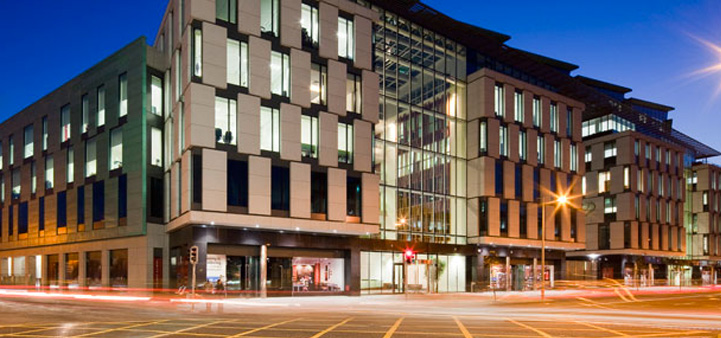Last September, the Junior Freshman students of 2016/17 waited in anticipation for their first experience of third level education to begin. General Science differs from many college courses, in that a single time-table is not administered during orientation week.
Instead, hundreds of students must flock together on their first day in order to select their modules for the year. The chosen modules then serve as crucial prerequisites for Bachelor moderatorships or specialties in Senior Freshman.
Over the summer, some of last year’s General Science students completed a survey relating to the academic and extra-curricular aspects of Junior Freshman. When asked if there was anything they wish they knew more about before starting college, a number of students referred to the module selection process.
One student said that they felt limited by the choices, and that they would have liked to sample different scientific disciplines among the options of Chemistry, Biology, Maths, Geology etc. Another student stated that the course title “General Science” was misleading for the same reason.
Upcoming Change
This is soon to change however. As proposed by the Associate Dean of Undergraduate Science Education, Professor Kevin Mitchell, the college is set to introduce streaming by the academic year 2018/19.
This streaming was raised at a meeting of the Undergraduate Studies Committee in November 2016, whereupon the dean stressed that, as it stands, the Science course is not truly a ‘General’ one. Professor Mitchell pointed out that half of the moderatorship options are closed off after modules are chosen anyway, and a reviewed system has subsequently been developed.
This change to the current system, as a facet of the Trinity Education Project, would mean that students would apply to one of four main strands of science in their CAO form. Future students will have the option to select either biological and biomedical sciences, physical sciences, chemical sciences, or geographical and geological sciences.
While over half of the surveyed students supported the proposal, the remainder argued that had it not been for the range of module options they would not have applied to General Science at Trinity College. One student’s reason for opposing the change was that she was initially “more interested in chemistry than biology… and then realised it wasn’t for her”.
These types of responses raise questions about how the new system could cause an increase in course transfer requests. What could ensue, if such requests are regularly declined, is a large number of graduates who regret their chosen paths within science.
Extracurricular Activities
The number of teaching hours that General Science students have a week is also a widely-known aspect of the course in Trinity College. On average students had 22 hours consisting of lectures, laboratory sessions and tutorials each week, in both Michaelmas and Hilary terms.
Despite the college hours required of each student, extra-curricular activities were not ruled-out. Only 14% of the surveyed students said that their academic timetable “highly” affected their extra-curricular commitments. A renowned benefit of the EMS (Engineering, Maths, and Science) faculty is its location on campus, in proximity to the sports hall, library and transport services.
This accessibility allows students to make the most out of college facilities, and maintain part-time jobs. In addition to this, first year students found they could still become active members of societies, utilise their gym memberships, and partake in sports such as rowing, fencing and trampolining.
Summer Exams
In April of this year, the Junior Freshmen sat their first official exams since the Leaving Certificate. For some, the conditions and prior study were expected. However, it was a rude awakening for others and a stressful experience that they admit could have been avoided.
After a challenging exam year in secondary school, some students felt under-motivated to work steadily throughout the year as advised by module lecturers. However, when asked if they could have changed their exam preparations, the majority of students said they would have revised earlier and read more past exam papers.
Some found having a “study-buddy” very useful when learning difficult chemistry or maths concepts, and they felt motivated by having someone else to work alongside.
Advice for Freshers
Junior Freshman for the General Science students proved to be a year filled with the exciting new experiences that come with the introduction to the scientific community. When asked if there was anything they wish they had known before college started, the new Senior Freshmen left some parting advice.
Joining societies, one student suggested, allows you to meet new people within science (that can offer tips for exam revision!). The same student noted that “not all lecturers are created equal” and that online lecture notes can vary between subjects – so it is important to attempt to attend every lecture.
Another student realised that laptops were not necessary for taking notes and that there was no initial pressure to buy one. The additional fee for lockers, lab coats, goggles and lab practical books was also highlighted as an unanticipated necessity for many.
When asked for any advice for incoming students regarding tutorials and labs, the surveyed students were eager to shed their accumulated insight. A common word of wisdom was to ensure attendance to reduce time spent catching up or “cramming” at the end of the year.
They highlighted how it is easy to neglect consistent studying that would have made more difficult concepts easier to grasp. Some students suggested pre-reading material before being lectured on it to help solidify the information. Students emphasised the importance and benefit of the Continuous Assessment marks denoted for lab reports and essays during the year.
Despite there being an emphasis on exam success in the survey, the students maintained that having a social life-study life balance should be prioritised. The new Senior Freshmen advised incoming students not to dwell on exam preparation too much, but rather to be consistent throughout the year while enjoying all that accompanies the first year of university.







